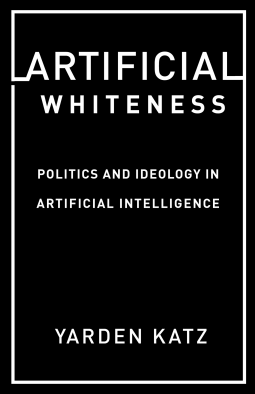
Artificial Whiteness
Politics and Ideology in Artificial Intelligence
by Yarden Katz
This title was previously available on NetGalley and is now archived.
Send NetGalley books directly to your Kindle or Kindle app
1
To read on a Kindle or Kindle app, please add kindle@netgalley.com as an approved email address to receive files in your Amazon account. Click here for step-by-step instructions.
2
Also find your Kindle email address within your Amazon account, and enter it here.
Pub Date Nov 17 2020 | Archive Date Feb 10 2021
Talking about this book? Use #ArtificialWhiteness #NetGalley. More hashtag tips!
Description
Yarden Katz reveals the ideology embedded in the concept of artificial intelligence, contending that it both serves and mimics the logic of white supremacy. He demonstrates that understandings of AI, as a field and a technology, have shifted dramatically over time based on the needs of its funders and the professional class that formed around it. From its origins in the Cold War military-industrial complex through its present-day Silicon Valley proselytizers and eager policy analysts, AI has never been simply a technical project enabled by larger data and better computing. Drawing on intimate familiarity with the field and its practices, Katz instead asks us to see how AI reinforces models of knowledge that assume white male superiority and an imperialist worldview. Only by seeing the connection between artificial intelligence and whiteness can we prioritize alternatives to the conception of AI as an all-encompassing technological force.
Bringing together theories of whiteness and race in the humanities and social sciences with a deep understanding of the history and practice of science and computing, Artificial Whiteness is an incisive, urgent critique of the uses of AI as a political tool to uphold social hierarchies.
Available Editions
| EDITION | Other Format |
| ISBN | 9780231194914 |
| PRICE | $35.00 (USD) |
Average rating from 4 members
Featured Reviews
 Kelly H, Educator
Kelly H, Educator
The book, "Artificial Whiteness," by Yarden Katz has been all over the internet with the current racial tensions in the United States. Written by someone who identifies as having grown up white, Katz helps challenge one's thoughts and beliefs about race and the definition of racism. With institutional racism garnering more notoriety, this book truly helped me see other lives in a different light. I found myself constantly processing the information found within to adjust my own beliefs.
I would never expect a person to completely change their belief system or core values based on one book, but Katz helps the reader fill in the area of our lives that most have never had to poke and prod. One concern I would have is that there are certainly those who may read this book and immediately go on the defensive. If that is you, then try to give it a chance. If you can't, that's fine, Katz presents a very heavy topic in a very challenging manner.
 Reviewer 678233
Reviewer 678233
As a math major, I was super intrigued by the interplay between race and artificial intelligence. Our world is becoming increasingly automated and driven by mathematical algorithms and models. We need to be hyper aware of the data we are using and it’s potential biases.
Overall, a very intellectual read so it was tough to get through at some points but it appealed to my math brain and drive for racial equality.
 Reviewer 309880
Reviewer 309880
technology replicates the existing structures of the world. It is not at all surprising to learn about the extent to which technology/AI benefits the groups with already a lot of privilege. I found the book interesting but a few years too late in publishing its thesis. I would have found more helpful to dedicate the book to better recommendations for how technology can avoid replicating the system it exists within





